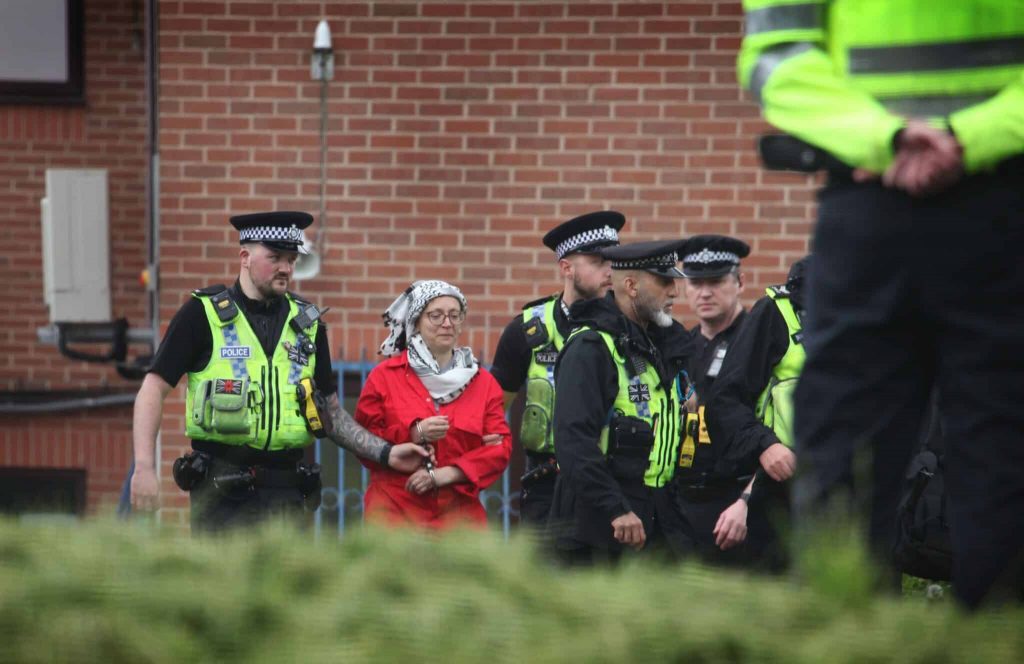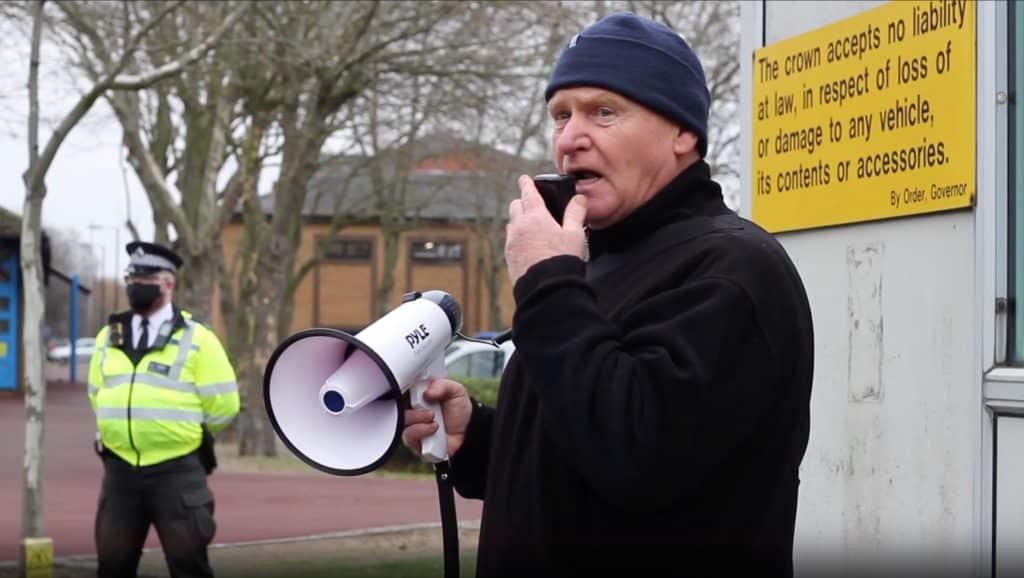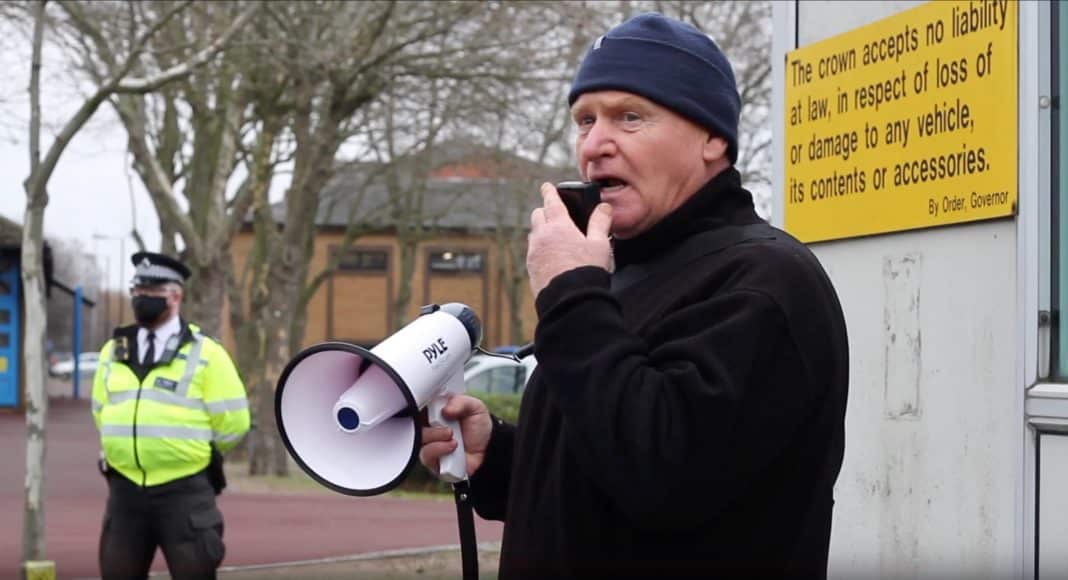FRFI has a long history of supporting prisoners in struggle against the system of punishment and incarceration. As part of this support we give space here on the Prisoners’ Fightback page to current and former prisoners to express their views. Below we publish two contributions on the important topic of how those incarcerated for political reasons can and should build solidarity behind bars. FRANCESCA NADIN, currently held on remand for Palestine support activities and former life-sentence prisoner JOHN BOWDEN write about the situation facing political prisoners in Britain and highlight lessons from the past that can assist the new generation of political prisoners in their struggle.
Fighting the system from within

It is essential for those of us who take politically-motivated actions, to insist on our status as political prisoners, something that the state denies us in its own cynical interests. But it is also essential to recognise that ALL those who are incarcerated are political prisoners, in a no less calculated way. I have seen here for myself that prison is nothing more than a tool of class oppression, a modern version of the poor house, where the underclass are labelled as delinquents, and sent to rot. All the while, great profit is made from them by the prison-industrial complex. For many, this place is like a second home, in and out of the revolving door, while profits rise, they are sent back for minor ‘misdemeanours’, or missing a parole appointment. We are never allowed to forget our status of undeserving scum who should be grateful for the free bed and board.
Millionaires who rob us of untold amounts of money, and governments that commit mass murder, are applauded, while petty shoplifters, and victims of domestic violence, are condemned and imprisoned for simply trying to survive. Sad to say that the majority of so-called socialists are amongst the ranks of those that delight in deriding those they label as criminals, forever stigmatising them, and destroying their future opportunities outside of prison.
The system is designed to coerce us into submission, both physically and mentally, and we are deliberately kept in ignorance, in order to be easily manipulated. Knowledge is power, and for this reason I put great emphasis on talking to my fellow inmates about why I’m here, and why and how we should resist our oppression. We must constantly remind each other not to normalise the treatment we receive. There is a deep understanding of oppression here by those who have suffered it their entire lives, so the conversations in which we share our ideas and experiences are invaluable, a unique opportunity to learn for all of us. I’m extremely grateful for this knowledge, and will always carry it with me. Unlike most other prisoners, I am incredibly privileged to have a voice, and it’s my responsibility to use this voice to share what I have learnt, to break the wall of silence and misinformation that the state constructs around the prison system. When I tell people outside, about the things that happen in here, they are shocked and appalled at the human rights abuses that are carried out with almost complete impunity. This is a country obsessed with sending people to prison – a disgraceful, inhuman, corrupt institution. Now, I am more certain than ever; that we must fight for its abolition.
Francesca Nadin
A4751FD, HMP New Hall
The struggle must continue behind prison walls

Prisons are a key component in the capitalist state’s coercive apparatus and function essentially to ensure social control and to ‘discipline and punish’ criminalised parts of the working class. Following the implementation of a range of police powers to erode and criminalise protest, we are currently seeing a sharp rise in the imprisonment of pro-Palestinian and environmental activists, who in turn are experiencing this attempt by the state to break their spirit.
This experience of imprisonment will in turn determine the strength of these activists’ political commitment. Prisons can be both incubators and incinerators of revolutionary spirit. They can be places where political conscience is deepened, where resistance movements are formed and where protests and rebellions can become a revolutionary frontline. In the words of US political prisoner Ed Mead in his autobiography Lumpen: ‘The duty of the captured revolutionary is to transform the prisons from instruments of repression into schools of liberation and revolution.’
For those now imprisoned for political protest, the struggle to resist repression should intensify in an environment where one is stripped completely of human rights and where refusal to conform is punished with prolonged solitary confinement and physical brutality. Prison can be the final testing ground for the captured protester, the place where political commitment and courage are severely tested within the belly of the beast.
Solidarity inside
The increasing number of political prisoners on remand or serving sentences can help to augment the politicisation of the prison population as a whole, creating frontlines of resistance within prisons. During the 1970s and 1980s Irish republican prisoners of war imprisoned in England actively organised with other prisoners to build solidarity and engage in collective acts of protest and defiance, and their position was that the struggle against British imperialism that they had fought on the outside must continue within its prisons, that contain the most oppressed and marginalised of the working class. This was clearly seen, for example, in the Hull prison uprising of 1976, when Irish POWs, black politicised prisoners and white English convicts, including both ‘social prisoners’ and members of the militant anarchist Angry Brigade, took over the prison for three days in a militant protest against staff brutality. In his memoir Inside an English jail, Irish POW Ray McLaughlin wrote: ‘…a great comradeship built up between all prisoners, blacks, English, Irish, everybody… it was really international in a sense…It was really as if you were released from prison.’
And solidarity outside
The increasing imprisonment of protesters supportive of groups like Palestine Action will necessitate a network of support from those on the outside that will seek to show solidarity with comrades battling the system inside. The full political potential of such external support for political prisoners was shown in the British occupied north of Ireland during the 1970s and 1980s with the anti-internment movement and support for H-block prison protesters. This movement concretely showed how central the prison struggle was to the wider anti-imperialist struggle for the liberation of Ireland.
It is therefore encouraging to see Palestine Action and other groups mounting protests outside the prisons where their activists are held, instigating mass complaints about their mail being withheld and other attacks on their rights. Hopefully those carrying out these principled acts of solidarity will come to understand that alongside the specific criminalisation of these political prisoners, the system oppresses all prisoners, and that the struggle involves fighting against the brutalisation and mistreatment of everyone behind bars. Aside from the Revolutionary Communist Group and some anarchist organisations, the so-called ‘revolutionary left’ in Britain has never recognised the significance of the prison struggle or the revolutionary potential of the imprisoned. But a time is approaching when the experience of prison will be an integral part of revolutionary political activity in Britain and the prison struggle will have to be recognised as a significant front in the broader class struggle.
John Bowden
FIGHT RACISM! FIGHT IMPERIALISM! 304 February/March 2025




